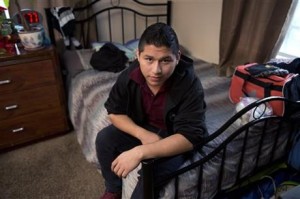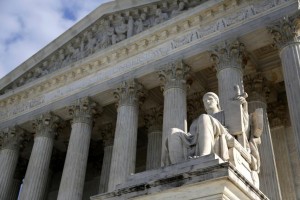Obama’s ‘Clean Plants’ Order Headed For Fast Supreme Court Decision
State Seeks Millions In Valley Methane Gas Leak
Seeking Safety, Young Migrants Find Abuse At Hands Of U.S. Placement
The Associated Press is releasing a Los Angeles-based investigative report that pretty much indicts the entire U.S. government effort to deal with those unaccompanied kids seeking a sanctuary in the United States. The tale of epic fail begins “… as tens of thousands of children fleeing violence in Central America crossed the border in search of safe harbor, overwhelmed U.S. officials weakened child protection policies, placing some young migrants in homes where they were sexually assaulted, starved, or forced to work for little or no pay, an Associated Press investigation has found.”
Responding to public pressure, the U.S. simply cut some corners. The AP notes that “… first, the government stopped fingerprinting most adults seeking to claim the children. In April 2014, the agency stopped requiring original copies of birth certificates to prove most sponsors’ identities. The next month, it decided not to complete forms that request sponsors’ personal and identifying information before sending many of the children to sponsors’ homes. Then, it eliminated FBI criminal history checks for many sponsors.”
The AP found dozens of children who were placed in abusive situations and reports that “Sen. Rob Portman, R-Ohio, who chairs the Senate’s bipartisan Permanent Subcommittee on Investigations, said he will hold a hearing on the agency’s child placement program Thursday because he is concerned that the failures are systemic.”
Read the AP story here: http://bigstory.ap.org/article/e87200e7361b412fa8c1d5003b7bf357/ap-investigation-feds-failures-imperil-migrant-children
Charter Schools Group Sues L.A. School Dist. For $224M
A leading California charter schools group is suing the Los Angeles School District for $224 million in bond money it claims was earmarked for charters but diverted. The L.A. based Courthouse News Service reports that the California Charter Schools Association claims in a Jan. 11 lawsuit that “… the LAUSD violated Proposition 39, the Smaller Classes, Safer Schools and Financial Accountability Act. The 2000 proposition amended the state constitution to reduce the voter threshold needed to approve school bonds from two-thirds to 55 percent.”
The CNS offers background: “Almost 20 percent of LAUSD school students attend independent charter schools, and in the past 10 school years enrollment in charter schools has increased by 400 percent, the association says. In that time, L.A. public schools decreased by 150,000, according to the complaint. The association says charter schools and students desperately need public funds to stay open and maintain their facilities. In 2008, California voters approved a $7 billion bond measure that included $450 million earmarked for charter schools.
Read the CNS coverage here:
http://www.courthousenews.com/2016/01/14/charter-schools-sue-lausd-for-millions.htm
Supreme Court Will Hear Immigration Case Affecting Millions
Sweeping immigration reform implemented by President Obama’s executive order, which was frozen by federal courts, will be heard by the U.S. Supreme Court. The court announced this week that it will hear the case that would impact tens of millions of people. CNN notes that “the Supreme Court — which already has a docket bursting with consequential issues — will likely rule on the case by early summer. If the Court greenlights the programs that are considered a centerpiaece of the President’s second term, they will go into effect before he leaves office.”
The CNN report offers background: “At issue is the implementation of the Deferred Action for Parents of Americans and Lawful Permanent Residents (DAPA) aimed at the approximately 4.3 million undocumented immigrants who are parents of U.S. citizens or lawful permanent residents, as well as an expansion of the 2012 Deferred Action for Childhood Arrivals (DACA) targeting teenagers and young adults who were born outside of the U.S. but raised in the country. The President’s actions allow eligible participants to obtain temporary lawful presence and apply for work authorization as well as some associated benefits.”
See the report here: Obama immigration reform: SCOTUS to hear actions – CNNPolitics.com
A Personal Post From The Publisher:
Back in December, CCM Publisher Sara Warner joined Buena Park School District, Children Giving Hope & Brentwood Home to deliver Brentwood Mattress to families in need. This is her post about that visit:
The weekend before Christmas, a group of 50 volunteers loaded Premier Chevrolet trucks with Brentwood Home mattresses to deliver to some very deserving families in Buena Park, California. Hundreds of families were surveyed to find out if there were family members in need of a warm bed to sleep on. With the assistance of Brentwood Home and volunteers, the event was able to provide a joyful Christmas surprise to 70 families!
According to Vy Wynn, CEO of Brentwood Home, ” Christmas is all about caring for those in need and the less fortunate. I’m glad that we decided to partner up with the school district & Giving Children Hope.” Even though the parents had been notified of the gift they would be receiving, most of the mothers shed tears of delight when the team arrived with a memory foam Brentwood Home mattress and bedding.
It was humbling to see many of the living situations these families were in: multiple children in sharing one bed and parents on couches or the floor. Even in light of these tough ciircumstances, there was so much light in every room we entered. One single mother of four mother stated, “Receiving this bed is a blessing from God. I don’t sleep well as it is, but I know this will make such an impact, not only on my sleep, but my attitude throughout the day as well.” (Children Giving Hope http://www.givingchildrenhope.org/beds-for-christmas/)
It was such a honor to join Buena Park, Children Giving Hope & Brentwood Home in a event that gave back to a community. We are very passionate about issues involving education at the California Courts Monitor and it was nice knowing these mattresses would ensure that some children would get a better night’s sleep for the challenging school day ahead.
We made a donation to Children Giving Hope as we were so touched how they are changing the lives of so many school children.. I hope you join us by visiting www.givingchildrenhope.org and making a generous contribution today.
Related videos::
Sara Warner CCM Publisher at Buena Park Mattress Giveaway Event-video
https://www.youtube.com/watch?v=Lpgy8b0HeGk-video
https://www.youtube.com/watch?v=u5vDSKksPXQ (spanish interview)
https://www.youtube.com/watch?v=IdCy3j3B3Rk
Permalinks:
http://www.givingchildrenhope.org/beds-for-christmas/ (link to their blog)
www.brentwoodhome.com
Maine Hotel Case Illustrates Civil Justice Rationing
U.S. Supreme Court Considers Huge Shift In Union Dues Collection
A 2013 California civil lawsuit is up for U.S. Supreme Court review this week and could dramatically change the organized labor landscape for public employees. The core issue in Friedrichs v. California Teachers Association is whether unions can collect fees from people who do not want to be in the union. The Los Angeles Daily News explains that “… since 1977, the court has allowed public-sector unions to charge the nonmembers whom they represent fees to cover the cost of bargaining over working conditions that will benefit those nonmembers as well as the union’s own ranks on the payroll… they cannot charge a fee to cover union political activity, such as lobbying or campaign spending…”
The case against the Teachers Association argues, in effect, that everything a union does is political – even bargaining. Everyone agrees that the controlling legal precedent is a case called Abood v. Detroit Board of Education, which actually moved the case through the lower courts relatively quickly. The Daily News notes that justices have signaled a sea change: “Although the Abood ruling remains a controlling decision, the court has been dropping hints for the past two years that the precedent has become shaky. A majority of the Justices joined in the critique, most strongly expressed in 2014 in Harris v. Quinn. The court said then that it is a ‘bedrock principle that, except perhaps in the rarest of circumstances, no person in this country may be compelled to subsidize speech by a third party that he or she does not wish to support.’
Thus, the challengers are turning their case into a ‘compelled speech’ dispute, treating union assessments as forcing nonmembers to embrace union goals.”
Read the Daily News story and follow the lawsuit here:
California Leads Way On Allowing ‘Organic’ Label Lawsuits
More states are expected to allow mislabeling lawsuits involving products labeled “organic” in the wake of a California Supreme Court decision. The Golden State’s unanimous ruling, explains the Associated Press, “… overturned a lower court decision that barred such suits on the grounds that they were superseded by federal law.”
The report in Salon.com offered some background: Congress wanted only state and federal officials to police organic food violations in order to create a national standard for organic foods, a division of the 2nd District Court of Appeal decided in 2013. But the state Supreme Court said allowing consumer lawsuits would further congressional goals of curtailing fraud and ensuring consumers can rely on organic labels. Experts cited in the report say other states will be expected to follow.




